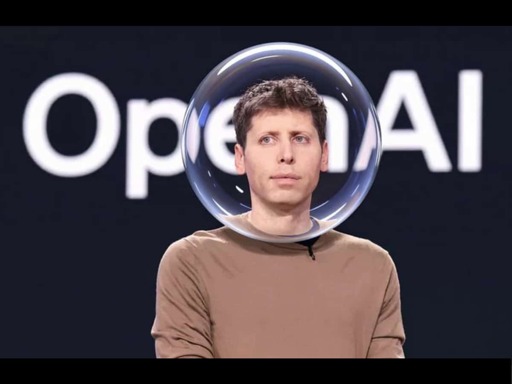As you’re no doubt aware, the global stock market is currently propped up by an ‘AI Bubble’. This means AI stocks are massively overvalued, and the situation may be worse than we knew:
Here’s a massive scoop from Ed showing OpenAI has been lying about their revenue for years
— Robert Evans (the Only Robert Evans) (@iwriteok.bsky.social) 2025-11-12T19:54:14.353Z
Will the AI bubble go pop?
The new revelations over the AI bubble can be summed up as follows:
Open AI’s services cost a lot more to run that we thought.Open AI’s services make a lot less money that we thought.
Exclusive: Based on documents viewed by this newsletter, OpenAI spent over $12.4 billion on inference from 2024 to September 2025. As part of its Microsoft revenue share, it sent $493.8m in 2024/$865.8m Jan-Sep 2025, implying lower revenues than previously reported.www.wheresyoured.at/oai_docs/
The news was broken by tech blogger Ed Zitron. Zitron shared his findings with the Financial Times, who received the following response from Microsoft:
We won’t get into specifics, but I can say the numbers aren’t quite right.
Reassuring, right?
The reason they asked Microsoft is because they’re joined at the hip with Open AI as a result of various deals. This is very common in the AI business, as this chart demonstrates:
This was supposed to be a chart that showed AI was *not* a bubble but it shows the exact opposite. This shows everyone is buying NVidia chips for a product(AI) that doesn’t have the sales to support, and Nvidia is using that demand to invest in companies so they….buy more chips pic.twitter.com/LRDF3REhaU
— Brandon Bradford (@BrandonLBradfor) October 17, 2025
The tech billionaires seem to agree the bubble will soon pop, because they’ve started talking about government bailouts:
OpenAI Execs allude to the company being too big to fail.
OpenAI CFO Sarah Friar stated that the company wants the U.S. government to provide a backstop or guarantee for AI financing.
Meanwhile, Sam Altman believes that the government is the “insurer of last resort” for AI… pic.twitter.com/Rudnas33nr
— Wall Street Rollup (@WallStRollup) November 6, 2025
Altman claims his company is essential because they’re on a path towards creating a super intelligence which will solve all the world’s problems (that or kill us – he’s speculated on both). The problem is that his company may never invent any form of intelligence, because generative AI models aren’t ‘thinking’ engines; they’re probability generators which essentially function like super charged auto-text.
When AI tools generate text, images, or videos, they will inevitably get things wrong, or ‘hallucinate’. We may never be able to fix this problem because of the fundamental way these tools generate output, and this is why companies keep abandoning AI initiatives:
An M.I.T. study found that 95% of companies that had invested in A.I. tools were seeing zero return. It jibes with the emerging idea that generative A.I., “in its current incarnation, simply isn’t all it’s been cracked up to be,” @JohnCassidy writes. https://t.co/DD2C4FXfgz
— The New Yorker (@NewYorker) November 2, 2025
I myself generally avoid using AI, but it seemed fitting to try it for this piece. For the image below, I asked various AI tools to make Altman’s head look like it was inflated – like a bubble – and this was the best I got:

This was the worst:

The big problem is that Open AI want to charge people $20-$200 a month for this garbage, and even then it might not be enough for them to turn a profit.
Wider problems
While AI companies in the medical field are doing interesting things, it’s sadly the case that the big players like Chat GPT are setting fire to the global economy so that users can generate slop like this:
My favourite thing to do in the Sora 2 app is putting Pikachu in every movie
This is Pikachu in Oppenheimer pic.twitter.com/jK0yrmVWYH
— Tenzin Dhonyoe (@_tenZdhon_) October 1, 2025
There is actually a reason for Donald Trump to support these companies, though, and it’s because the AI bubble is hiding wider problems in the US economy:
“US companies announced the most job cuts for any October in more than two decades”, Bloomberg reports.
153,074 jobs were lost, the most since 2003.
If it weren’t for the AI bubble, the US would be in deep recession. 80% of Americans already live in areas in recession.
Link:… pic.twitter.com/CxmoXzLdj1
— Ben Norton (@BenjaminNorton) November 7, 2025
In other words, when the bubble pops, it may only be the beginning of a series of great economic shocks.
Who could have predicted it, eh?
*COUGHS* Karl Marx *COUGHS*.
Featured image via AI
By Willem Moore
From Canary via this RSS feed


